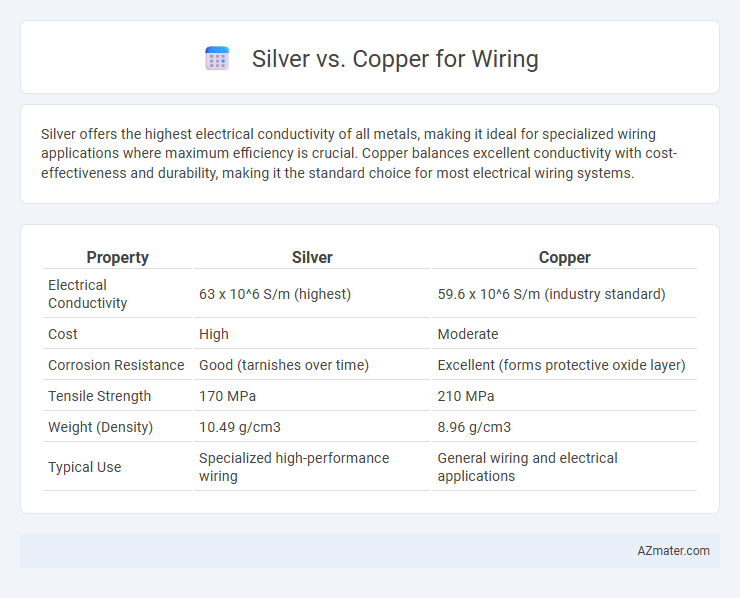Silver offers the highest electrical conductivity of all metals, making it ideal for specialized wiring applications where maximum efficiency is crucial. Copper balances excellent conductivity with cost-effectiveness and durability, making it the standard choice for most electrical wiring systems.
Table of Comparison
| Property | Silver | Copper |
|---|---|---|
| Electrical Conductivity | 63 x 10^6 S/m (highest) | 59.6 x 10^6 S/m (industry standard) |
| Cost | High | Moderate |
| Corrosion Resistance | Good (tarnishes over time) | Excellent (forms protective oxide layer) |
| Tensile Strength | 170 MPa | 210 MPa |
| Weight (Density) | 10.49 g/cm3 | 8.96 g/cm3 |
| Typical Use | Specialized high-performance wiring | General wiring and electrical applications |
Introduction to Electrical Wiring Materials
Silver offers superior electrical conductivity compared to copper, making it an excellent choice for specialized high-performance wiring applications. Copper remains the most widely used wiring material due to its optimal balance of conductivity, cost-effectiveness, and mechanical strength. Understanding these fundamental differences is crucial for selecting appropriate materials in electrical wiring projects.
Overview of Silver and Copper Properties
Silver exhibits the highest electrical conductivity among all metals, measuring approximately 63 x 10^6 S/m, which makes it ideal for minimizing energy loss in wiring applications. Copper, with a conductivity of about 59 x 10^6 S/m, offers excellent electrical performance combined with superior corrosion resistance and mechanical strength. Both metals possess high ductility and thermal conductivity, but copper is more widely used due to its cost-effectiveness and balance between electrical efficiency and durability.
Electrical Conductivity: Silver vs Copper
Silver boasts the highest electrical conductivity of all metals, approximately 6.30 x 10^7 S/m, surpassing copper's conductivity of about 5.96 x 10^7 S/m. This superior conductivity means silver wires can carry electrical current more efficiently with less resistive loss compared to copper. Despite silver's conductivity advantage, copper remains more widely used in wiring due to its lower cost and adequate conductivity for most applications.
Cost Comparison: Silver and Copper Wires
Silver wires conduct electricity with approximately 6% higher conductivity than copper, but their cost is significantly greater, with silver priced at around $25 per ounce compared to copper's average of $4 per pound. The high cost of silver wiring makes it impractical for most standard electrical applications, where copper offers an economical compromise of good conductivity and affordability. For large-scale wiring projects, copper remains the preferred material due to its balance of performance and substantial cost savings over silver.
Corrosion Resistance and Durability
Silver exhibits superior corrosion resistance compared to copper due to its ability to form a stable, non-reactive oxide layer that protects the metal beneath from further oxidation. Copper, while widely used for wiring because of its excellent electrical conductivity and affordability, tends to corrode more easily when exposed to moisture and air, leading to potential reliability issues. Silver's enhanced durability in harsh environments makes it an ideal choice for high-performance wiring applications where long-term integrity and minimal maintenance are critical.
Mechanical Strength and Flexibility
Copper offers superior mechanical strength and flexibility compared to silver, making it more suitable for wiring that requires durability and resistance to bending or twisting. Silver has a higher tensile strength but is less ductile, causing it to be more brittle under mechanical stress. Copper's combination of strength and flexibility ensures reliable performance in electrical wiring applications where frequent movement or vibration occurs.
Applications in Residential and Industrial Wiring
Silver offers superior electrical conductivity and corrosion resistance, making it ideal for specialized industrial wiring where optimal performance and durability are critical. Copper remains the preferred choice for residential wiring due to its excellent conductivity, affordability, and ease of installation, meeting standard safety codes and electrical demands. In industrial settings, copper's balance of cost-effectiveness and reliability sustains its widespread use, while silver is reserved for high-performance circuit components or extreme environments.
Environmental Impact and Sustainability
Silver and copper are widely used in electrical wiring, but copper is more environmentally sustainable due to its abundant availability and lower extraction impact compared to silver. Copper's recyclability rate exceeds 90%, significantly reducing resource depletion and energy consumption, whereas silver, being rarer, has a higher environmental footprint from mining activities. Choosing copper wiring supports sustainable practices by minimizing ecological damage and promoting efficient resource use in electrical applications.
Safety Considerations and Fire Resistance
Silver wiring offers superior conductivity, which reduces heat generation and minimizes fire risk in electrical systems compared to copper. Copper, while less conductive, is more widely used due to its high tensile strength and reliability in preventing electrical faults that can cause fires. Both metals require proper insulation and installation techniques to ensure maximum safety and effective fire resistance in residential and commercial wiring applications.
Choosing the Best Material for Your Wiring Needs
Silver offers superior electrical conductivity compared to copper, making it ideal for high-performance or specialized wiring applications where minimal resistance is critical. Copper balances conductivity, cost-efficiency, and durability, providing excellent corrosion resistance and flexibility for general electrical installations. Selecting between silver and copper depends on budget constraints, application requirements, and environmental factors to ensure optimal wiring performance and longevity.

Infographic: Silver vs Copper for Wiring
 azmater.com
azmater.com